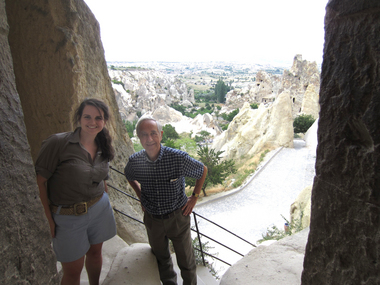
Nine residents of New Orleans and Baton Rouge recently took a whirlwind Turkish tour under the auspices of the Atlas Foundation, a Metairie nonprofit organization with a mission of fostering cultural understanding.
Among other facts, the travelers learned that a good Muslim is expected to give 1/40 of his net worth to charity; the highest quality Turkish carpet is woven with more than 900 knots per square inch; and Turkey’s economy is one of the fastest growing in Europe.
Social worker and author Orissa Arend had been curious about Islam since the Sept. 11 terrorists attacks. Her desire to learn more had spurred her and her husband, Richard Saxer, to participate in a Christian/Muslim dialogue group coordinated through Trinity Episcopal Church and the Atlas Foundation. Through interfaith dinners, movies, cooking classes and discussions, they became intrigued by the culture and charmed by the Turkish people.

The couple traveled with Julianna Padgett, assistant dean of Tulane’s School of Social Work; Corinne Barnwell, a retired social worker; the Rev. Eugene Jacques, pastor of St. Catherine of Siena Church; Margaret Restucher, a lawyer; and the Rev. Richard Stiltner and Connie Boudreaux, both of Baton Rouge, under the guidance of Atlas Foundation Director Emrah Aktepe.
It was a cultural tour that included visits to college campuses, a newspaper office, mosques and private homes, as well as archeological sites, Rumi’s tomb and the place where the mother of Jesus lived after the crucifixion.
This enigmatic nation was fascinating yet elusive to fathom even for this multidisciplinary group. Turkey is an ancient land where Noah’s Ark is said to have come to rest after the flood, where Homer set his mythic Trojan War and the Byzantine Empire founded its capitol in Constantinople. Now a modern city with 13 million people, Istanbul boasts high-speed transportation and energy-efficient green technology.

The Louisiana group visited Samanyolu television studios, where original programming is broadcast worldwide for free. Turkish TV has been instrumental in modernizing and unifying the country, said newscaster Erkan Kindam.
At the Journalists and Writers Foundation office, Huseyin Hurmali explained the mission of his organization is to “create dialogue over division.” Turkey’s leadership has taken bold steps to transform the country.
“In 1980, everything changed and we started building a global economy,” Hurmali said. New political parties wrested power from the military elite and a middle class was born. “Anatolian tigers” — Turkish entrepreneurs — are now driving the economy.
While crisscrossing the city, surprising affluence was evident with dozens of dining establishments, shopping malls and high-rises. Ninety-nine percent of Turks are Muslim, and more than 3,000 mosques dot Istanbul’s landscape.
“When I was startled awake at 4:30 a.m. by the call to prayer from a nearby mosque, I realized that Turkish people are undoubtedly committed to their Muslim faith,” the Rev. Stiltner said.
On several occasions, host families welcomed the group for traditional home-cooked dinners. One patriarch, Fatih Ozger, who had made his fortune selling and later manufacturing kitchenware, gave his guests stainless steel pots engraved with their names. In 2005, his son Talha worked at Pizza Florence in Metairie while studying business at University of New Orleans. The Ozger family is planning to open a pizzeria in Manhattan.
“The generosity and warmth of the families will sit with me the rest of my life,” Barnwell said.
The second day, the group visited Istanbul’s European side, toured Topkapi Palace, Hagi Sophia and the Kariye Museum. Everywhere, Turkish women moved freely, some dressed in modern attire or “covered” by headscarves and, at times, enshrouded in black niqabs.
“Our female guide Aylin explained it is a woman’s a choice to cover her head or not,” Padgett said. Aylin Atalay, who did not don a headscarf, told them, “It is important that your heart be covered more than your head.”
Departing Istanbul, the visitors explored caves in Cappadocia, the labyrinthian underground city in Derinkuyu and ancient Greek city of Ephesus. In Kayseri, they toured the site of a mental hospital founded in 1206 for Gevher Nesibe, a sultan’s sister. When he forbade her to marry an Army general, later killed in battle, she asked the sultan to build the sanctuary where patients were treated with acoustics, baths and positive affirmations.

In Konya, they saw Merve Mehmet Ozdemir Elementary School where exceptional students studied math four hours daily. A private businessman had donated money to build the school.
“I had no idea how advanced this country was with smart, energetic people who value the schools,” said Saxer, a former teacher.
The amicable group enjoyed meeting each other and traveling together.
“What we got out of the trip was magnified by seeing it through each others’ eyes,” Arend said.
By Mary Rickard
http://blog.nola.com/new_orleans/2012/10/atlas_foundation_of_metairie_e.html
